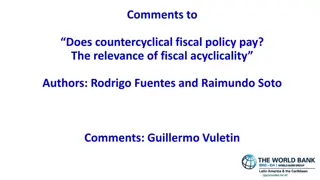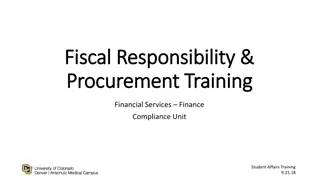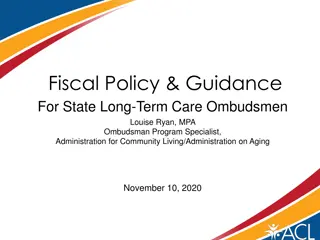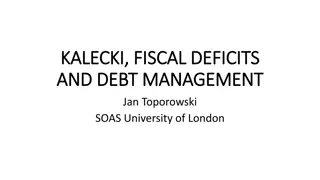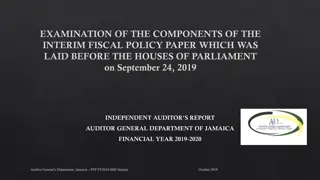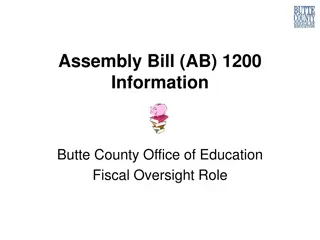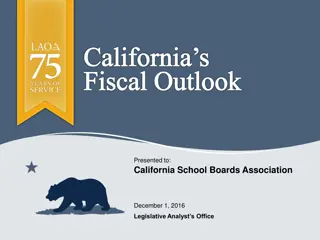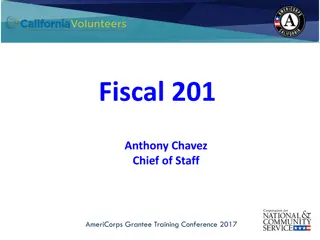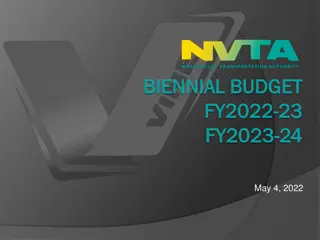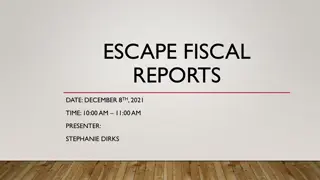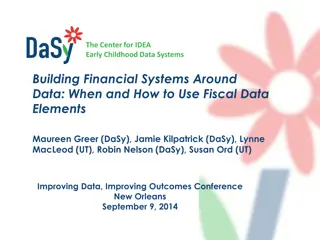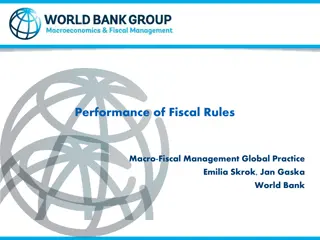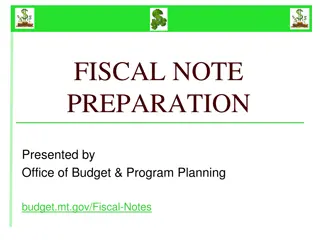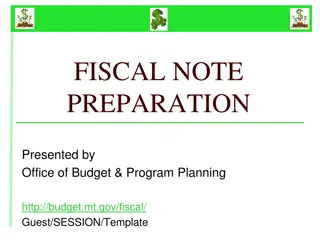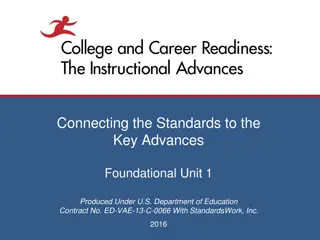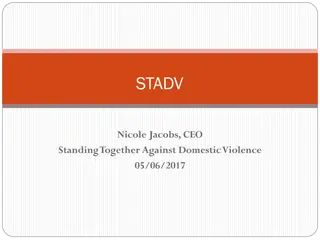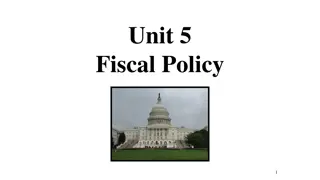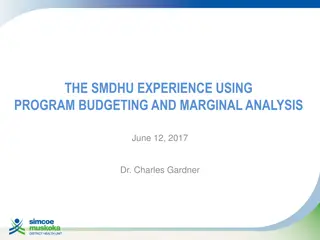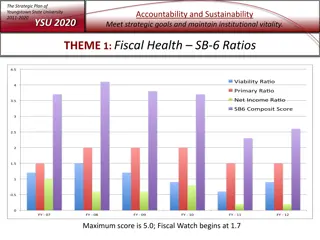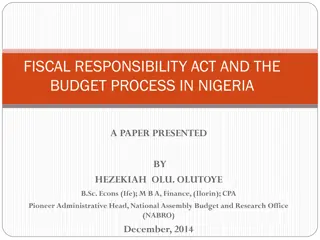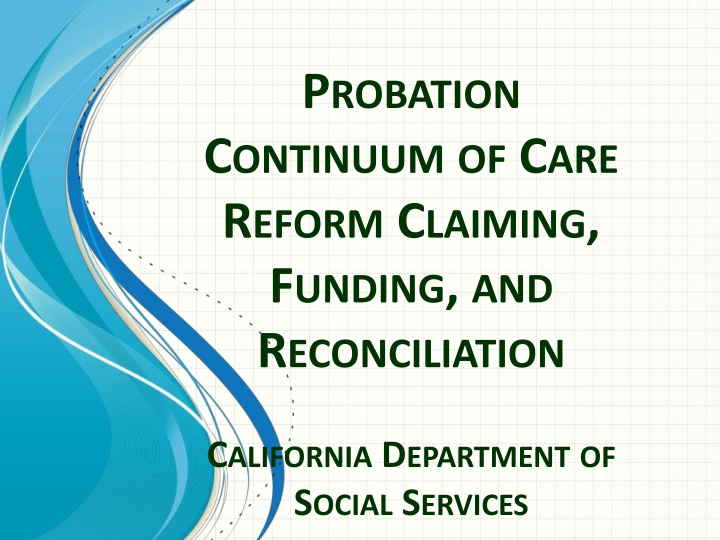
Probation Continuum of Care Reform in California Department of Social Services
Explore the continuum of care reform in the California Department of Social Services with a focus on probation, Title IV-E claiming, funding, and reconciliation. Discover the goals, administrative components, and funding allocations for foster parent recruitment, retention, and support programs.
Download Presentation

Please find below an Image/Link to download the presentation.
The content on the website is provided AS IS for your information and personal use only. It may not be sold, licensed, or shared on other websites without obtaining consent from the author. If you encounter any issues during the download, it is possible that the publisher has removed the file from their server.
You are allowed to download the files provided on this website for personal or commercial use, subject to the condition that they are used lawfully. All files are the property of their respective owners.
The content on the website is provided AS IS for your information and personal use only. It may not be sold, licensed, or shared on other websites without obtaining consent from the author.
E N D
Presentation Transcript
PROBATION CONTINUUM OF CARE REFORM CLAIMING, FUNDING, AND RECONCILIATION CALIFORNIA DEPARTMENT OF SOCIAL SERVICES
OBJECTIVES Probation Title IV-E claiming Funding Continuum of Care Reform (CCR) Claiming and Reconciliation
CCR Goals Reducing the usage of congregate care placement settings by moving to Home- Based settings. Increasing the use of home-based family care Restructured the previous age-based rate system to a Level of Care rate system based on an assessment of the child s need.
Administrative Components of CCR All County Letter (ACL) ACL No. 15-76 ACL No. 15-88 County Fiscal Letter (CFL) CFL No. 15/16- 48 Subject Foster Parent Recruitment, Retention and Support (FPRRS) ACL No. 16-84 CFL No. 16/17-22 CFL No. 17/18-09 CFL No. 17/18-09E CFL No. 15/16-65 Child and Family Team (CFT) ACL No. 16-10 ACL No. 16-58 Resource Family Approval (RFA) ACL No. 17-122 CFL No. 16/17-71 Second Level Administrative Reviews CCR Home Based Family Care Rate Structure (Phase I) CCR Home Based Family Care Rate Structure (Phase II) ACL No. 16-79 CFL No. 16/17-41 CFL No. 16/17-41E CFL No.16/17-41EII CFL No. 17/18-32 CFL No. 17/18-32E ACL No. 17-11
Foster Parent Recruitment, Retention and Support (FPRRS) Funding available for County Probation Departments (CPD) to invest in activities to recruit and retain the number of foster parents, relative caregivers and resource families available for placement of court dependent minors or non-minor dependents (NMDs). Program Codes: PC 939 Probation FPRRS Federal PC 940 Probation FPRRS Training Federal PC 941 Probation FPRRS Non-Federal PC 943 Probation FPRRS Foster Parent Training Federal
FPPRS Allocation FPPRS FY 2015-16 FY 2016-17 FY 2017-18 Allocation $17.2m $43.2m $43.2m (CWD and CPD) (CWD and CPD) (CWD and CPD) $721,549 $15.5m $15.5m (participating CPDs) (participating CPDs) (participating CPDs) Includes: $5m to LA Includes: $5m to LA $10.5m based on % of RCL costs $10.5m based on % of RCL costs Unspent funds from FY 2015-16 Unspent funds from FY 2016-17* Notes Unspent funds rolled over to FY 2016-17 Unspent funds rolled over to FY 2017-18 *Authority exists; CDSS working with CPOC to operationalize; CFL pending. FY 2015-16: CFL 15/16-58 FY 2016-17: ACL 16-52 FY 2017-18: CFL 17/18-37
Child and Family Teams (CFT) A CFT is a group of individuals that includes the child or youth, family members, professionals, natural community support and other individuals identified by the family who are invested in the child, youth and family s success. Program Codes: PC 947 Probation CFT Federal PC 948 Probation CFT Non-Federal PC 955 Child and Family Team (CFT) Detention - Probation Non-Federal
CFT Allocation CFT FY 2015-16 FY 2016-17 FY 2017-18 Allocation -- $22m $51.1m (CWD and CPD) (CWD and CPD) $1.6m CPDs $5.6m CPDs Unspent funds from FY 2016-17* Notes Funds were distributed based on a percent to total of the average point-in-time FY 2015-16 Child Welfare Services Foster Care cases as reported on the CA Child Welfare Indicators Project. Unspent funds rolled over to FY 17-18 The FY 2017-18 GF allocations for the counties participating in the Title IV-E California Well-Being Project will be included in a forthcoming Title IV-E California Well- Being Project final allocation CFL, but are also displayed in CFL 17/18-42 *Authority exists; CDSS working with CPOC to operationalize; CFL pending. FY 2016-17: CFL 16/17-24 FY 2017-18: CFL 17/18-42
Resource Family Approval (RFA) RFA improves the way caregivers (relative and non-relative) are approved by prepping families to better meet the needs of vulnerable children, youth and NMDs in the county child welfare and/or probation systems. The RFA replaces multiple existing processes of licensing or certifying foster homes, approving relatives, non-relative extended family members (NREFMs), prospective adoptive parents and legal guardians. Program Code: PC 889 RFA Probation Federal PC 897 RFA Probation Non-Federal
RFA Allocation RFA FY 2015-16 FY 2016-17 FY 2017-18 $27.9m Allocation -- Allocation provided to CWD (CWD and CPD) $10.6m* Total non-federal costs = $14.3m Of which $6.3m was offset by subsumed activities within the 2011 Realignment base funding $8m in GF Unspent funds rolled over to FY 17-18 subsumed activities $1.2m CPDs Based on budget assumption for FFA conversion with minimum floors: Very small counties = $3,000 Small counties = $3,000 Medium counties = $10,000 Unspent funds from FY 2016-17** *$10.6m associated with licensing activities related to RFA were realigned for CWDs **Authority exists; CDSS working with CPOC to operationalize; CFL pending. Notes CFL 17/18-47
RFA The CPDs may use PC 130 (PROBATION IV-E/TRAINING) to claim enhanced rate RFA-related staff development activity costs. See CFL No.15/16-65 for more information.
Second Level Administrative Reviews Second level administrative review approval requirements for children of any age, including Non-Minor Dependents (NMD) in group homes and Short-Term Residential Therapeutic Programs (STRTP) authorized through AB 403 and AB 1997 effective January 1, 2017. Extension approval must be approved by the County Welfare Department Director/Deputy Director or CPD Chief Probation Officer or his/her designee. Probation cases must be re-evaluated every 12 months. Costs captured in the PC 127 (Probation Case Management) will automatically shift in the County Expense Claim.
Second Level Review Allocation Second Level Review FY 2015-16 FY 2016-17 FY 2017-18 Allocation -- $23,000 $23,000 (CWDs and CPDs) (CWDs and CPDs) $8,000 CPDs $8,000 CPDs Unspent funds from FY 2016-17* Notes Funds were distributed based on FY 2015-16 group home caseload percentages, by county, from California Child Welfare Indicators Project. *Authority exists; CDSS working with CPOC to operationalize; CFL pending. Minimum floor of $85 applied to each county. Counties with funding over $150 were adjusted to help meet the minimum floor. CFL 16/17-51 Unspent funds rolled over to FY 2017-18
CCR Reconciliation What does this mean for Probation? Framework of Funding Data Collection Tracking of Cases Determination of Probation Savings
Framework of Funding and Reconciliation With the implementation of CCR, CDSS provided an upfront investment via assistance and administrative cost: Level of Care Rate System FPRRS, CFT, RFA, 2nd Level Admin Review Assistance savings will be generated through the stepdown of expensive GH placements to less expensive lower levels of care. CDSS will reconcile the assistance savings with the upfront CCR administrative investments with the goal of reducing future investments. The Department will begin to reconcile FY 16-17 in the Fall of 2018.
Framework of Funding CDSS will look at the caseload movement post CCR. In assistance, a pre-CCR cost per case was developed for each program (FC. AAP, Kin-GAP etc.). A by county analysis will be conducted on a post-CCR cost per case for each program. Any change from the pre-CCR cost per case will be the net result of the increase due to the Home-Based Family Care rate, offset by a reduction in cost from the step down of higher cost group home cases to lower levels of care.
Reconciliation Process CCR administrative costs will be monitored on a quarterly basis through the budgeting process and CDSS will make budget adjustment based on actual claims. Any savings from the GH stepdown will be used to offset future CCR administrative funding for each county.
Reconciliation Process Continued Program costs that remain due to lack of reinvestment funds from cases moving out of congregate care will continue to be funded. Expenditures that exceed the statewide amount allocated for the services programs will be considered during the budgeting process.
CDSS Website www.cdss.ca.gov/inforesources
Questions or Concerns? Fiscal/Claiming: Fiscal.Systems@dss.ca.gov RFA Program: RFA@dss.ca.gov CFT Program: CWSCoordination@dss.ca.gov General CCR: CCR@dss.ca.gov

